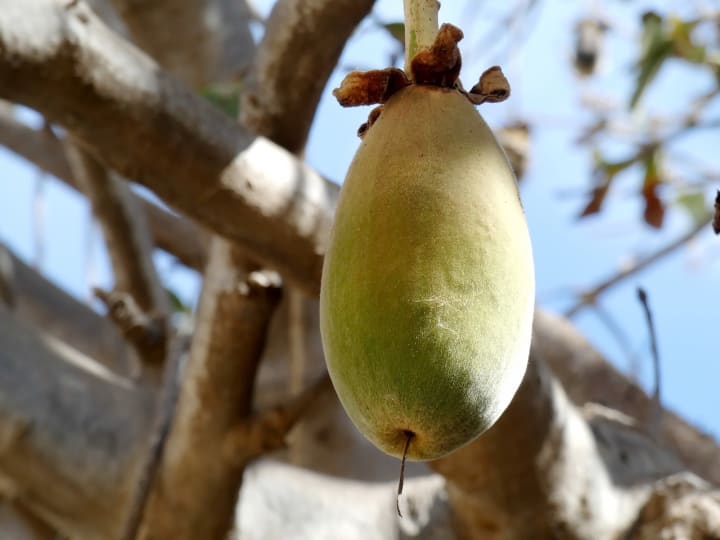5 Incredible Health Benefits of Baobab Powder
Baobab Fruit Powder: Superfood from the Tree of Life

The baobab fruit has a wealth of health advantages. Learn the top 5 benefits of eating baobab fruit and how they can improve your health in general. This article reveals the amazing health benefits of this African wonder fruit, from enhancing immunity to aiding digestion.
1. High in Essential Vitamins and Minerals
The nutritional content of baobab fruit varies depending on the tree's geographical location and the parts it is harvested from, including the leaves, pulp, and seeds.
In addition to vitamin C, baobab fruit contains antioxidants and several essential minerals such as potassium, magnesium, iron, and zinc. Calcium and high-quality proteins are abundant in the leaves. Fibre, fat, and micronutrients like thiamine, calcium, and iron are also abundant in the seeds and kernels of this plant.
Among its many nutrients, powdered baobab fruit is especially rich in vitamin C, vitamin B6, niacin, iron, and potassium.
2. May help with weight loss
Adding baobab powder to your diet may help you lose a few pounds, according to some research.
Its ability to suppress cravings and encourage feelings of satiety can aid in consuming less and reducing hunger pangs. A smoothie containing 15 grammes of baobab dramatically reduced sensations of hunger when compared to a placebo drink, according to a short study involving 20 participants.
Baobab fruit contains a lot of fibre, with the majority of powdered preparations containing about 4.5 grams per tablespoon. Fibre passes through your body slowly, keeping you satisfied for a longer period of time.
Other research demonstrated that simply increasing your daily fibre intake by 14 grams will lower your calorie intake by up to 10% and lower your body weight by an average of 4.2 pounds (1.9 kg) over the course of four months.

3. May Facilitate In Balancing Blood Sugar Levels
Blood sugar regulation may be aided by consuming baobab fruit.
Adding baobab to white bread did, in fact, reduce the amount of readily absorbed starch and halt the rise in blood sugar levels, according to one study.
The addition of baobab to white bread reduced the amount of insulin required to transport sugar from the blood to the tissues, aiding in the regulation of blood sugar levels, according to another study involving 13 individuals.
Baobab's high fibre content may also aid in preventing blood sugar spikes and crashes and long-term level stabilisation by slowing the bloodstream's absorption of sugar.
4. Inflammation Might Be Decreased by Antioxidant and Polyphenol Content
Baobab is rich in antioxidants and polyphenols, which are compounds that protect your cells from oxidative damage and reduce inflammation in your body.
According to research, chronic inflammation may play a role in a wide range of diseases and disorders, such as diabetes, cancer, autoimmune disorders, and heart disease.
Some research suggests that baobab may help lower levels of inflammation in the body, despite the fact that the majority of current studies have been carried out on animals.
One rat study discovered that baobab fruit pulp decreased numerous inflammatory biomarkers and supported heart health.
Baobab extract improved oxidative cell damage and inflammation, according to a mouse study.
However, additional investigation is still required to establish how baobab might affect inflammation in people, despite these encouraging results.

5. An abundance of fibre may improve digestive health
Baobab is a significant source of fibre, and only one tablespoon of the powder can provide up to 18% of your daily fibre intake.
Fibre is vital to the health of your digestive system since it passes through your gastrointestinal tract undigested. Additionally, fibre serves as a prebiotic, feeding the good bacteria in your stomach and enhancing the health of your gut microbiota.
According to studies, boosting your fibre intake may also help you avoid developing illnesses including intestinal ulcers, inflammatory bowel disease, and haemorrhoids.
How to incorporate baobab powder into your diet
Finding fresh baobab in countries where the fruit is not grown may be challenging. Fortunately, powdered baobab can be found at a variety of both high street and online health food stores.
Baobab powder taste has a mild citrus flavour. Try adding the powder to your preferred drinks, such as water, juice, tea, or smoothies, for a quick and handy way to get your daily dosage of baobab. For a treat that is high in antioxidants, you can also add baobab powder to baked goods or sprinkle a little over yoghurt, oatmeal or muesli.
There are numerous ways to consume baobab and take advantage of its unique health benefits.
Potential Side Effects
Although most individuals can safely consume baobab, there are a few potential side effects to be cautious of.
The seeds and pulp include antinutrients such as phytates, tannins, and oxalic acid that may reduce the availability and absorption of nutrients.
However, most people shouldn't be concerned about the small number of antinutrients found in baobab, especially if you consume a well-balanced diet rich in other nutrient-dense whole foods.
Cyclopropenoid fatty acids, which are present in baobab oil and may prevent the formation of fatty acids and perhaps lead to health problems, have also drawn attention.
Research shows that processing significantly eliminates these dangerous compounds, making it unlikely that they would endanger the health of the majority of individuals.
Key Takeaways
- Baobab has been linked to a number of remarkable health advantages.
- Baobab has a variety of essential nutrients, and including it in your diet may also help with weight loss, blood sugar regulation, inflammation reduction, and digestive health.
- Baobab powder is simple to obtain and remarkably adaptable, making it simple to incorporate into your diet.
- Baobab includes certain antinutrients and cyclopropenoid fatty acids, which may have harmful effects but are reduced through processing. However, it has not been adequately investigated for pregnant or nursing women.
About the Creator
Kai Cowell
Master Herbalist since 2017
Ex Strength & Conditioning Coach and Martial Arts Instructor
Aspiring Nature, Health and Flash Fiction writer






Comments
There are no comments for this story
Be the first to respond and start the conversation.